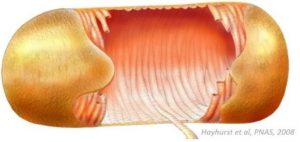Faculty Researchers

William Bishai, MD, PhD
William Bishai, MD, PhD is a Professor of Medicine, Pathology, and Molecular Microbiology and Immunology. He is the Co-director of the Johns Hopkins University Center for Tuberculosis Research. The William Bishai Laboratory studies the molecular pathogenesis of tuberculosis. The overall goal of our laboratory is to better understand tuberculosis pathogenesis and then to employ this understanding toward improved drugs, vaccines and diagnostics. Since Mycobacterium tuberculosis senses and adapts to a wide array of conditions during the disease process, it is clear that the regulation of expression of virulence factors plays an important role in pathogenesis. As a result, a theme of our research is to assess mycobacterial genes important in gene regulation. We are also interested in cell division in mycobacteria and the pathogenesis of caseation and cavitation. Bishai Laboratory Website; Bishai bio, Bishai Laboratory Website; Bishai bio Johns Hopkins Center for Tuberculosis Research; Bishai Research Dashboard and Publications
 Richard Chaisson, MD
Richard Chaisson, MD
Richard Chaisson, MD is and Professor of Medicine, Epidemiology and International Health. He is the Director of the Johns Hopkins Center for Tuberculosis Research and the Director of the Johns Hopkins Center for AIDS Research (CFAR). Research in the Richard Chaisson Lab primarily examines tuberculosis and HIV infection, with specific focus on global epidemiology, clinical trials, diagnostics and public health interventions. Our recent research has involved evaluating a molecular diagnostic test for tuberculosis in HIV patients; observing TB responses during treatment of pulmonary tuberculosis; and examining antiretroviral therapy adherence, virologic and immunologic outcomes in adolescents compared with adults in Southern Africa. Chaisson bio Johns Hopkins Center for AIDS Research (CFAR); Chaisson bio Johns Hopkins Center for Tuberculosis Research; Chaisson Research Dashboard and Publications
 Kelly Dooley, MD, MPH, PhD
Kelly Dooley, MD, MPH, PhD
Kelly Dooley, MD, MPH, PhD is an Assistant Professor of Medicine and Pharmacology and Molecular Sciences. The Dooley Lab focuses on clinical pharmacology of new anti-tuberculosis regimens with an emphasis on: (1) Phase I clinical trials of new or existing anti-TB drugs including dose escalation trials and studies of drug-drug interactions between anti-TB agents and antiretrovirals to treat HIV; (2) Use of PK/PD analysis and modelling in Phase II tuberculosis clinical treatment trials to determine concentration-effect relationships that will allow for optimization of dosing; and (3) Evaluation of TB and HIV drug concentrations in special populations, such as pregnant women and children; (4) Evaluation of treatment-shortening regimens for drug-sensitive TB and investigational regimens for treatment of multidrug-resistant TB; and (5) Translational work involving novel animal models of cavitary pulmonary TB disease to understand drug distribution in diseased lung. Dooley bio Johns Hopkins Center for Tuberculosis Research; Dooley Research Dashboard and Publications
 Susan Dorman, MD
Susan Dorman, MD
Susan Dorman, MD is an Adjunct Professor of Medicine. Work in the Susan Dorman Lab focuses on the development and evaluation of new diagnostic tests for tuberculosis (TB). Our multidisciplinary work in tuberculosis diagnostics includes test development, accuracy assessments, implementation research, economic evaluations, and mathematical modeling. Dorman bio Johns Hopkins Center for Tuberculosis Research; Dorman Research Dashboard and Publications
 David Dowdy, MD, PhD, ScM
David Dowdy, MD, PhD, ScM
David Dowdy, MD, PhD, ScM is an Associate Professor of Medicine and Epidemiology. The David Dowdy Lab conducts research in the field of infectious disease epidemiology. We use an interdisciplinary approach that involves infectious disease modeling, health economics, classical epidemiology, and operational and implementation science. Much of our work explores the diagnosis and treatment of tuberculosis. We also have a longstanding interest in “translational epidemiology,” with a goal of developing methods to help medical professionals who use epidemiological data make decisions that are in the best interest of patients and public health. Dowdy bio Johns Hopkins Center for AIDS Research (CFAR); Dowdy bio Johns Hopkins Center for Tuberculosis Research; Dowdy Research Dashboard and Publications
 Jonathan Golub, PhD, MPH
Jonathan Golub, PhD, MPH
Jonathan Golub, PhD, MPH is an Associate Professor of Medicine, Epidemiology, and International Health. Research in the Jonathan Golub Lab focuses primarily on the epidemiology of tuberculosis (TB), specifically in patients infected with HIV. We work with the CDC to explore potential delays in TB diagnoses as well as the risk factors that contribute to death from TB in the United States. Our research also includes ongoing studies of HIV and TB patients in Brazil and South Africa. Golub bio Johns Hopkins Center for Tuberculosis Research; Golub Research Dashboard and Publications
 Amita Gupta, MD
Amita Gupta, MD
Amita Gupta, MD is an Associate Professor of Medicine and the Deputy Director of the Johns Hopkins University Center for Clinical Global Health Education (CCGHE). The Amita Gupta Lab focuses on drug trials to prevent and treat HIV, tuberculosis (TB) and other co-morbidities in adults, including pregnant women and children who reside in low-income settings. We also conduct cohort studies assessing HIV, inflammation and nutrition in international settings; TB in pregnancy; and risk factors for TB in India (CTRIUMPH). We collaborate with several faculty in the Center for TB Research, Division of Infectious Diseases and the School of Public Health. Regional Prospective Observational Research in Tuberculosis (RePORT India); Baltimore-Washington-India Clinical Trials Unit; Gupta bio Johns Hopkins Center for Clinical global Health Education (CCGHE); Gupta bio Johns Hopkins Center for Tuberculosis Research; Gupta Research Dashboard and Publications
 Christopher Hoffmann, MD, MPH
Christopher Hoffmann, MD, MPH
Christopher Hoffmann, MD, MPH is an Associate professor of Medicine. The Hoffmann Lab is focused on reducing TB and HIV morbidity and mortality in the low and middle income settings through behavioral and implementation science approaches. Work has focused on understanding individual-level behavior towards linkage to care and continued care engagement for HIV and TB and using this knowledge to develop approaches to increase HIV testing, linkage to care, HIV viral load suppression, and retention in care. Other work has focused on health system strategies to improve service delivery and improve adherence to best practice to guidelines-based care. The group’s research includes work on the general population, corrections inmates and ex-inmates, men at risk for HIV, and recently hospitalized individuals. Most of the research has been in South Africa and elsewhere in sub-Saharan Africa. Hoffmann bio Johns Hopkins Center for Tuberculosis Research; Hoffmann Research Dashboard and Publications
 Sanjay Jain, MBBS, MD
Sanjay Jain, MBBS, MD
Sanjay Jain, MBBS, MD is a Professor of Pediatrics and Director of the Johns Hopkins University Center for Infection and Inflammation Imaging Research.Jain bio Johns Hopkins Center for Tuberculosis Research; Center for Infection and Inflammation Imaging Research; Jain Research Dashboard and Publications
 Petros Karakousis, MD
Petros Karakousis, MD
Petros C. Karakousis, MD is a Professor of Medicine. The Karakousis Lab is primarily focused on understanding the molecular basis of Mycobacterium tuberculosis persistence and antibiotic tolerance. A systems biology-based approach, including the use of several novel in vitro and animal models, in combination with transcriptional, proteomic, genetic, imaging, and computational techniques, is being used to identify host cytokine networks responsible for immunological control of M. tuberculosis growth, as well as M. tuberculosis regulatory and metabolic pathways required for bacillary growth restriction and reactivation. Karakousis Laboratory website; Karakousis bio Johns Hopkins Center for Tuberculosis Research; Karakousis Research Dashboard and Publications
 Emily Kendall, MD, PhD
Emily Kendall, MD, PhD
Emily Kendall, MD, PhD is an Assistant Professor of Medicine in the Infectious Diseases division at the Johns Hopkins University School of Medicine. Her research focuses on infectious diseases dynamics and antibiotic resistance.
Her current work focuses on understanding tuberculosis transmission, treatment outcomes, and regimen development. She uses mathematical models and computational approaches to guide optimal use of drug regimens and other tools for more effectively combating tuberculosis on the level of individual patients and large-scale epidemics.
Dr. Kendall received her B.A. from Harvard University and her M.D. from the Vanderbilt University School of Medicine. She completed her residency at Massachusetts General Hospital and a fellowship in infectious diseases at Johns Hopkins. Kendall bio Johns Hopkins Center for Tuberculosis Research; Kendall Research Dashboard and Publications
 Gyanu Lamichhane, PhD
Gyanu Lamichhane, PhD
Gyanu Lamichhane, PhD is an Associate Professor in the Division of Infectious Diseases, Department of Medicine, Johns Hopkins University School of Medicine. Investigating fundamental aspects of microbial life and leveraging the findings to develop clinically useful tools are equally emphasized in his research program. In 2012, he established a research program titled ‘Taskforce to study Resistance Emergence & Antimicrobial development Technology’ (TREAT).
Dr. Lamichhane’s current research focuses on identification and characterization of essential proteins of peptidoglycan biosynthesis and development of new antibacterials that work by interfering with this pathway. Peptidoglycan is the exoskeleton of bacterial cells without which bacteria cannot survive. The historical model of the peptidoglycan is narrow and does not adequately describe important aspects present in several clinically important bacteria. Dr. Lamichhane’s group focuses on the non-classical pathways for synthesis of peptidoglycan in mycobacteria. 
Lamichhane Laboratory website; Lamichhane Publications; Lamichhane bio Johns Hopkins Center for Tuberculosis Research; Lamichhane Research Dashboard and Publications
 Yukari Manabe, MD
Yukari Manabe, MD
Yukari Manabe, MD is a Professor of Medicine. Investigators in the Yukari Manabe Lab evaluate the accuracy of rapid, point-of-care diagnostics for HIV, tuberculosis and related infectious diseases in resource-limited settings particularly sub-Saharan Africa and examine the impact of diagnostic interventions on disease detection and patient outcomes. The team also conducts operational and translational research in tuberculosis and HIV co-infection.Manabe bio Johns Hopkins Center for Clinical global Health Education (CCGHE); Manabe bio Johns Hopkins Center for Tuberculosis Research; Manabe Research Dashboard and Publications
 Eric Nuermberger, MD
Eric Nuermberger, MD
Eric Nuermberger, MD is a Professor of Medicine. Research in the Eric Nuermberger Lab focuses primarily on experimental chemotherapy for tuberculosis. We use proven murine models of active and latent tuberculosis infection to assess the effectiveness of novel antimicrobials. A key goal is to identify new agents to combine with existing drugs to shorten tuberculosis therapy or enable less frequent drug administration. We’re also using a flow-controlled in vitro pharmacodynamic system to better understand the pharmacodynamics of drug efficacy and the selection of drug-resistant mutants during exposure to current agents. Nuermberger bio Johns Hopkins Center for Tuberculosis Research; Nuermberger Research Dashboard and Publications
 Maunank Shah, MD
Maunank Shah, MD
Maunank Shah, MD is an Associate professor of Medicine. Work in the Maunank Shah Lab focuses on infectious disease modeling and health economics, and seeks to investigate new strategies for diagnosing HIV and tuberculosis (TB) in areas with limited resources, both domestically and abroad. Our primary focus is TB diagnostics, with studies examining the diagnostic test accuracy, cost-effectiveness and programmatic impact of emerging diagnostics. We have developed mobile health initiatives to incorporate video-based therapy for TB treatment, and we have a longstanding interest in interventions that help to reduce or prevent HIV transmission. Shah bio Johns Hopkins Center for Clinical Global Health Education (CCGHE); Shah bio Johns Hopkins Center for Tuberculosis Research; Shah Research Dashboard and Publications